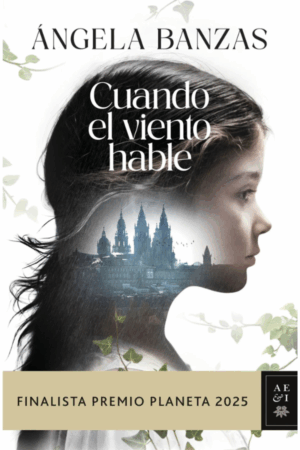Cuando el viento hable / When the Wind Whispers
Finalist for the 2025 Planeta Prize
A country in silence. A mystery that still breathes. A post-war family drama.
Sofía is born in the autumn of 1939, after a family tragedy, and grows up surrounded by secrets in the post-war rural Galicia. Her paternal grandparents raise her under strict supervision, while her father, a librarian who lives hidden in the shadows, feeds her imagination with fantastic stories.
She does not understand why her family is hiding her or who is this girl that seems to materialize before her like a hallucination. After being admitted to the Royal Hospital of Santiago, she finds refuge in Julia, her first true friend. There, clandestine corridors and traces of a buried past emerge to reveal new mysteries. And what does this green-eyed young man who has suddenly burst into her life and seems to have so many answers want?
This novel explores the power of imagination in the face of horror, and of love as the last hope. Even in the darkest moments, a great story can save our lives.
A coming-of-age novel, a historical drama and a mystery that draws on Gothic elements with disturbing, sometimes magical atmosphere.
This work evokes collective memory from a very human perspective. It has great emotional depth and employs elegant, accessible language.
Its protagonist is truly memorable: a young woman born in 1939 with a voice that combines innocence and precocious lucidity. The other female characters give voice to a group of women who elicit empathy in readers.
The historical setting is one of its greatest attractions, as are the locations: rural areas of Galicia, the Costa da Morte and the Royal Hospital of Santiago. All of them serve as symbolic territories of mystery and beauty.
The author shines with her literary sensitivity thanks to her rhythmic, carefully crafted prose, laden with sensory and metaphorical imagery.
An original approach to the historical trauma of the post-war period, combining the horror of Franco’s medical experiments with a poetic, metaphorical and deeply human narrative.
The author retains the elements that have won her thousands of readers: captivating writing, a sensory use of the Galician landscape, great feminist sensitivity and an enormous capacity to interweave plots from the present and the past.
The story flows smoothly between memory, fantasy, trauma and hope. It denounces institutional violence and the use of the female body as a battlefield.

